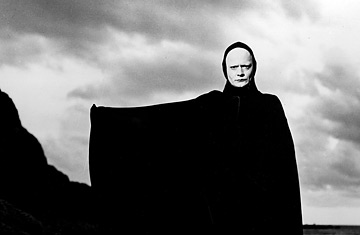
The Criterion Collection
Available Dec. 4, List Price $99.95
The 50s can now be seen as a great decade for foreign-language films, in quality and even more in its seductive impact on new viewers. The Italians, the Japanese and later the French made films that were must-sees, back when foreign movies accounted for 5% of the U.S. theatrical market, or about 10 times its current pathetic portion. Among these giants, the Swedish writer-director stood tallest, certainly loomed largest. Bergman educated an entire generation — mine — to cinema literacy. (Time, in its punnier days, dubbed it "cinemacy.") He was the focus of so much high-IQ adulation, the butt of so many critical debates, that we took it for granted that every serious person went to his films, digested and discussed them. But 50 years is plenty of time for an artist's luster to turn to rust. By the time of his death this July, Saint Ingmar, or Damned Ingmar, has devolved into Ingmar Who?
So here is basic Ingmar, prime Ingmar, Ingmar for dummies: the four films that made and cemented his reputation. Smiles of a Summer Night (1955): period romantic comedy at its most acerbic and rapturous. The Seventh Seal (1957): during the Black Plague, a knight plays chess with Death. Wild Strawberries (1957): An old man relives his youth, is pained by its bitterness, ennobled by memories. The Virgin Spring: the medieval fable, of brutality and redemption, that brought the director his first Oscar. Even at the steep price, this is the ideal starter set for Bergman novitiates. I'd love for some of you to try it, and let me know if the films work their old magic on receptive young viewers.
Criterion has done its usual comprehensive, fastidious job. You get commentaries by Bergman scholars Peter Cowie and Birgitta Steene, essays by Pauline Kael and John Simon, some introductory remarks from the master himself and a feature-length documentary, Ingmar Bergman on Life and Work, by director Jörn Donner. Best of all, clear new subtitles. The old white type on white image was a strain on the eyes. And when Smiles of a Summer Night originally opened in the U.S., a few lines of the innocently suggestive dialogue between Ulla Jacobsson (who's also on the extras) and Bibi Andersson was deemed too steamy for American viewers — so it wasn't translated. Now you'll know what they're saying, and you'll see the films in pristinely restored condition. They look as least as fresh as they did in the 50s, when cinephiles couldn't wait for the next Bergman film. Those new to his work are lucky. They have the chance to discover Four Masterworks.